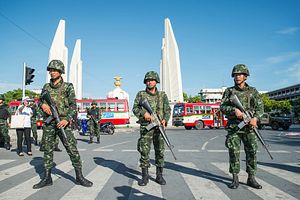To the surprise of few Thai observers, in August Thailand’s legislative assembly, packed with military men and military allies, chose coup leader Prayuth Chan-ocha to be the prime minister, until elections supposedly to be called late next year or early in 2016. Prayuth thus became the first Thai coup leader in decades to take the job as prime minister in Thailand, rather than finding a fig leaf civilian as interim prime minister, solidifying the notion that this was indeed a “hard” coup more similar to the draconian authoritarian rule in Thailand in the 1950s and 1960s than the “soft” coup that took place in 2006. The military, Bangkok elites, and the royal family supposedly learned from the 2006 “soft” coup that only a “hard” coup could really wipe out Thaksin Shinawatra’s organization in Thailand and entrench elite rule for at least another generation. The 2006 coup was followed by a new constitution and then elections that resulted in a pro-Thaksin Shinawatra party winning power again, thus defeating–in the minds of Bangkok elites–the very purpose of the coup.
Given that this is a “hard” coup and that the dour and fierce Prayuth himself is now prime minister, what should we expect to see under the next year, or year and a half, of Prayuth’s rule? Of course, that assumes that Prayuth will only rule for a year or so–some Thais already are comparing Prayuth to military leaders of the 1950s and 1960s, who ruled for years if not decades.
Purges within the army
The coup leaders have detained activists, politicians, academics, journalists, and other potentially outspoken and or pro-Thaksin, or simply pro-democracy, voices. They have not yet launched purges within the armed forces, probably because Prayuth has wanted to be careful to maintain support, and he knows that many mid-level officers and regular soldiers are sympathetic to Thaksinite parties and ideas. Still, during the next year or two expect to see Prayuth and his allies combing the ranks of mid-level and higher officers for men perceived to be sympathetic to Thaksin. Officers from the pro-Queen’s Guard faction will be moved up in the ranks. Similar purges already are occurring in other parts of government. Already, the boards of state enterprises are being purged of Thaksin sympathizers, replaced with staunch royalists and Prayuth allies.
A verdict against former prime minister Yingluck Shinawatra, leaving her with a choice of either jail or exile
In the past, one of the long-held truths of Thai politics was that, while peons fought out battles in the streets, and sometimes were arrested and jailed, Thai elites never were tried and jailed, even when they actually led violent street protests or contributed directly to violence. In addition, Thai politicians could be charged with offenses, but rarely actually served any jail time even if they were found guilty. This truth no longer seems to hold. Although Yingluck has not gone into exile yet, and she may believe that the military will not actually oversee a trial in which she gets jail time, she will ultimately be faced with this possibility. Of course, royalists and members of the Democrat Party who led the street protests that helped oust Yingluck and, in some cases, contributed to violence, will not face jail time.
Re-arrests and much harsher treatment of junta critics, activists, and other outspoken Thais
So far, the coup leaders have been relatively careful to keep detentions short and treatment of political detainees – who, of course, should not be detained at all simply for speaking out – mild enough that the military can maintain a fiction that the detainees are just being spoken with, and can deny any reports of rough treatment. This deniability has helped keep the junta in good graces with most of its Southeast Asian neighbors, who are always wary to criticize anyway, and with Japan, the most important investor in Thailand by far. But Thai society is not as placid and subservient as it was in the 1950s and 1960s, and eventually many activists, red shirt leaders, academics, and other voices – some of whom supposedly were freed from their original detentions after promising not to be involved in politics – will speak out again. This time, with relations with Asian countries shored up, the economy back on track (somewhat) and Thaksin’s political machine quieter, the junta likely will detain people again and keep them in jail for much longer periods of time. In my next post, I will examine whether, during Prayuth’s time as prime minister, the United States and other leading democracies will be able to influence Thailand’s future direction.
Joshua Kurlantzick is a fellow for Southeast Asia at the Council on Foreign Relations. This post appears courtesy of CFR.org and Forbes Asia.
































